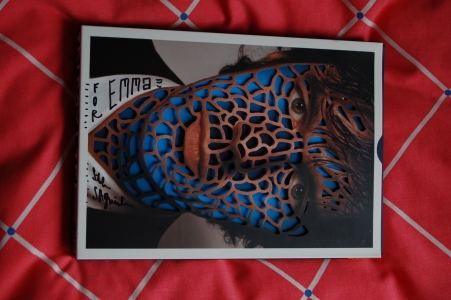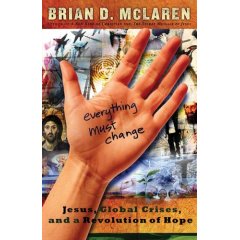by emma | Jun 26, 2008 | Books

Just finished reading Vince Antonucci’s book, I Became A Christian And All I Got Was This Lousy T-shirt. It’s been on my radar for a while, and I picked a copy up last time I was hanging out with Ally and losing more money in the FM shop. Vince’s book is all about challenging us to leave behind boredom and to start passionately following after Jesus. I’ll be honest, there were no major new things or mind-boggling moments for me, but this is far and away the funniest book I have read in a long time! It’s laugh-out-loud stuff, such as Vince’s “Top Ten Reasons I’m Glad I Don’t Live In A Monastery”!
The book is great, and I recommend you read it if only for the sheer fun of it! That said, it’ll make you take a fresh look at some of your preconceptions. Funny AND spiritual – how’s that for ya!
Check out Vince’s blog at www.vinceantonucci.com
Check out the book’s website at www.lousytshirtbook.com
by emma | May 21, 2008 | Books
I went to a book signing in the Lighthouse today by Stefan Sagmeister, an internationally renowned graphic designer. Sagmeister created the opening event for the Six Cities Design Festival last year, and has designed work for musicians such as the Rolling Stones, Aerosmith and Pat Metheny.

[Left] The cover for the Rolling Stones album, Bridges To Babylon, designed by Stefan Sagmeister.
He’s just released a new book, titled Things I Have Learned In My Life So Far. It’s one of the most beautiful books I’ve held in my hands! It’s got such an innovative design, all the chapters in separate parts and contained in a cardboard box. I even found a little diary entry on the inside of the container box!


It’s a series of maxims from his personal journal, which he transformed into typographic works. Some pretty cool little maxims…
“Having guts always works out for me.”
“Trying to Look good limits my life.”
“Complaining is silly. Either act or forget.”
“Thinking life will be better in the future is stupid. I have to live now.”
It was great to meet Sagmeister, to have a short chat and get my book signed. I’m really looking forward to reading through the rest of the book!
by emma | Apr 10, 2008 | Books
Recently I read This Beautiful Mess by Rick McKinley, pastor at Imago Dei in Portland. (A huge thanks to the lovely friend who purchased this off my wishlist for me!) I’ve been meaning to blog some thoughts from it for a while, and thanks to Kate’s prompting, that day is today.
McKinley’s book is a very readable, straightforward look at the kingdom message Jesus presented in the Gospels – and by straightforward I mean, he talks about what it would look like and how it would impact us if Jesus really meant the things he said. Things like, become like little children, or about not pulling out the weeds lest you pull out the wheat too.
One of the aspects that I found most challenging was thinking about how to become like little children. How can I learn from kids? Rick talks about how they are exploring this at Imago Dei through Learning Labs, and encourages us to think outside the box and allow children to teach us. Play with kids in the dirt and learn the basics again: God is big. God made worms.
“I think it announced, in the strongest terms possible, the revolution of Jesus – that it was here, authentic, costly, and worth everything. Every welt and lump and scar on Paul’s battered body announced the beautiful reality of the kingdom of God.”
Rick talks about this idea of strategic suffering, and its the other major thing that struck me. I go so far out of my way to avoid suffering if at all possible, but the disciples, and many modern day saints, are living lives of strategic suffering. What would it look like if I put your needs above my comfort? If I really stuck my neck out for you? I reckon my life would look a lot different to how it does now.
A few more quotes I like…
“When Jesus talked about the kingdom, He never talked about us building it or advancing it. Never. He said, “The kingdom is…” He simply invited His followers to see it, embrace it, believe in the unfading reality of it.”
“Relevance comes from relationship – it means we matter to someone, he or she matters to us, and we both know it.”
“We’re finding that the genius of the kingdom is nearly always in simplicity. We keep asking: What’s the need? And how can we meet it simply?”
“To be human is to live with loose ends, with people and in a world of loose ends, feeling you’ve been made for perfection but knowing you can’t get there on your own.”
Holly was reading this too… want to balance out my view?
by emma | Mar 14, 2008 | Books
While I was in the US I read Brian McLarens latest book, Everything Must Change: Jesus, Global Crises, And A Revolution Of Hope. Last Friday I got to chat with Brian a little bit after the CPW service, so I thought it was time I shared some thoughts from the book.

In Everything Must Change, McLaren addresses global issues of security, justice, and prosperity, and suggests that the way in which we live pulls us into a suicidal system which needs to change. The book addresses a myriad of topics, such as global warming, patriotism, and economic poverty. Personally, I didn’t find this to be a ‘life-changing’ book, but I reckon it would be an excellent introduction for someone who wants to learn more about these issues, and as such I enjoyed it.
Some thoughts…
“Other societies work on what we will call theocapitalist narratives, which mythologize markets and their products with a divine power to bring happiness.”
This one really struck me, as it put words what I’ve felt for a long time now. I’d never heard it called theocapitalist before, and will probably do some research to try find out a bit more about this idea.
“Politically, we produce and sell weapons in unimaginable numbers, and then we tax the profits to build defenses against those to whom we sold the weapons. We build an economy of war in hopes that it will produce for us a world of peace.”
Brian talks a lot about the politics and economics of war in the book, which I don’t feel I can make too much comment on as a non-American, but some of the quotes and statistics he shared were scary. This one seems to sum it up for me – building an economy of war in hopes of peace. It is striking that the top 5 countries in weapons manufacturing are also the same 5 countries who are permanent members of the UN Security Council… ironic?
“It is only when we can imagine the world to be different than the way it is that we can be empowered to embody this alternative reality which is God’s kingdom and resist this present nightmare of brokenness, disorientation and confusion… A liberated imagination is a prerequisite for facing the future… If we cannot have such a liberated imagination and cannot countenance such radical dreams, then the story remains closed for us and we have no hope.”
[Brian Walsh & John Middleton]
“Christianity stands or falls with its revolutionary protest against violence, arbitrariness and pride of power and with its plea for the weak. Christians are doing too little to make these points clear rather than too much. Christendom adjusts itself far too easily to the worship of power. Christians should give more offense, shock the world far more, than they are doing now. Christians should take a stronger stand in favour of the weak rather than considering first the possible right of the strong.”
[Dietrich Bonhoeffer]
by emma | Mar 11, 2008 | Books
“Our president is not organising another political party, nope… not even running with Nader on the Green ticket. Jesus is forming a new kind of people, a different kind of party, whose peculiar politics are embodied in who we are. The church is a people called out of the world to embody a social alternative that the world cannot know on it’s own terms. We are not simply asking the government to be what God has commissioned the church to be. After all, even the best government cant legislate love. We can build hundreds of units of affordable housing (a good thing by the way) and people still might not have homes. We can provide universal health care and keep folks breathing longer (another nice move), but people can be breathing and still not truly be alive. We can create laws to enforce good behaviour, but no law has ever changed a human heart or reconciled a broken relationship. The church is not simple suggesting political alternatives. The church is embodying one.“
[Shane Claiborne & Chris Haw, Jesus For President]
by emma | Mar 8, 2008 | Books
As I mentioned before, on Wednesday over the duration of my flight and time at the airport waiting, I read The Big Idea by Dave Ferguson, Jon Ferguson and Eric Bramlett. I found it a very easy read, and a quick one too, yet it has so many little snippets that if implemented could have a huge impact on the way we think about church. Here’s a few brief thoughts…
“The average Christian is educated to at least three years beyond their level of obedience.”
Dave quotes this as being something his teacher in seminary said, and it’s one of those statements as soon as you hear it, it cuts, but you know its true. I know way more than I do. What would happen if we stopped learning and started doing? And yes, I know we (I) talk about that a lot… but really, if we actually acted out the things we know we should be doing?
“More often results in less action, and less often results in more action. It’s a paradox.”
It’s another one of Jesus’ beautiful paradoxes… less is more, the least is the greatest, the servant is the leader, lose your life to gain it… I am convinced more and more that this life Jesus calls us to is one of incredible paradoxes.
“If artists are going to do art in the church, the leadership must trust the artists’ judgement regarding which risks are worth taking and which risks are not… One of the greatest gifts a church can give its artists is the space or time to create.”
“Competition is a good thing. It can be tremendously motivating, and surrounding yourself with capable people breeds healthy competition.”
Rick wrote a great post on competition a while ago, I’ll let his words speak on this subject…
“Many in that first launch team had not explored far beyond the boundaries of Jerusalem. And now Jesus was telling them that this great adventure would be led by someone they couldn’t see, would cost them all they could see, and would take them places they’d never been! That’s Jesus’ really Big Idea for every church.”






Recent Comments